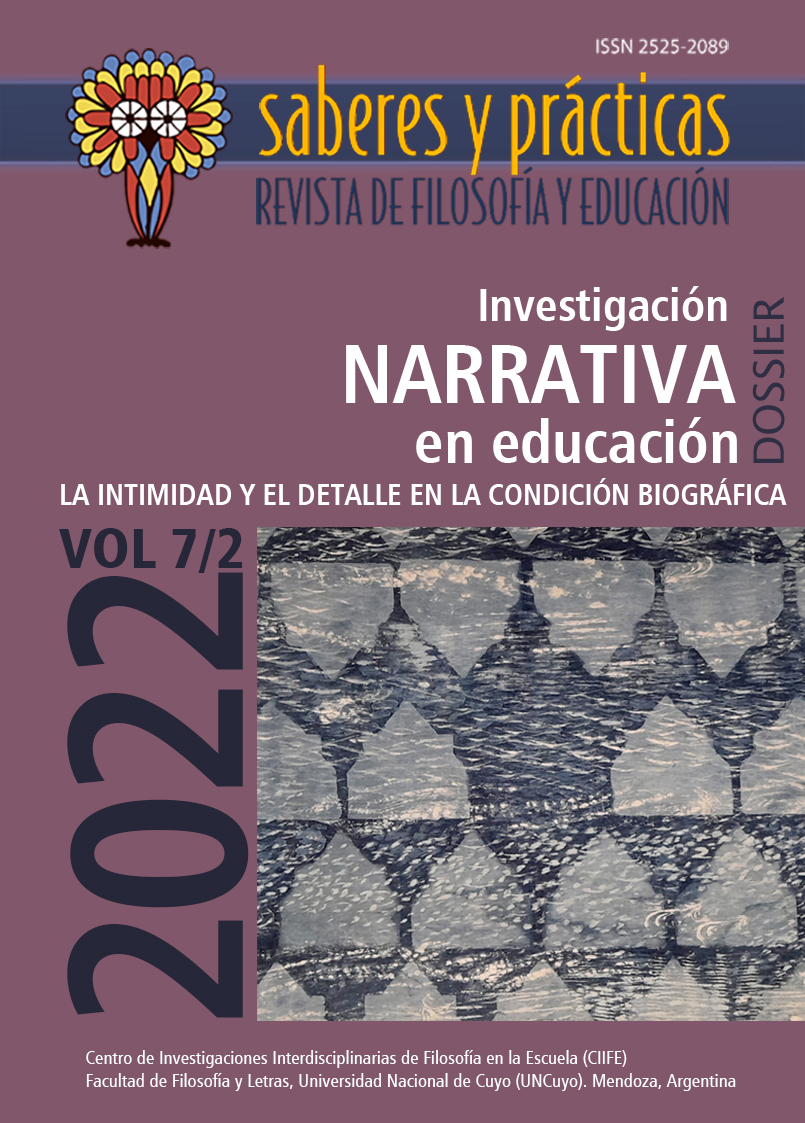Ethnographic research: autobiographical experiences in a secondary school in the city of Mar del Plata, province of Buenos Aires
DOI:
https://doi.org/10.48162/rev.36.080Keywords:
Ethnographic research, secondary school, narratives, autobiography, affectationAbstract
Ethnographic research has developed widely in recent decades, it has been adopted by numerous fields of knowledge: sociology, social psychology, history, and other social disciplines. From a broad and traditional perspective, ethnography can be understood from a triple meaning: as a method, as a text, and as a perspective (Guber, 2014). We are interested in returning to this last meaning since it leads us to reflect on its complexity, beyond the spoken word, to recover the gestures, sensations, emotions, looks, sentiments that give meaning to everyday events. The multiple dimensions of knowledge that are put into play in field work as lived experience (Quirós, 2011) as researchers can be expanded and discussed by considering the fact of "letting ourselves be affected" as a methodological instrument. Accompanying and understanding the socio-educational processes in secondary school, its daily life, integrates experiences that constitute, from each particular subject, significant actions of production and social reproduction and cultural appropriation, thus daily life encompasses a large number of activities through which students, teachers, parents give existence to the school within the cultural horizon that circumscribes each community.
Downloads
References
Achilli, E. (2005). Investigar en Antropología Social. Los desafíos de transmitir un oficio. Laborde.
Achilli, E. (2009). Escuela, familia y desigualdad social. Una antropología en tiempos neoliberales. Laborde.
Balbi, F. (2012). La integración dinámica de las perspectivas nativas en la investigación etnográfica. Intersecciones en Antropología, N° 13, pp. 485-499
Bénard Calva, S. (Coord.) (2019). Autoetnografía. Una metodología cualitativa. Universidad Autónoma de Aguscalientes. El Colegio de San Luis.
Bourdieu, P. y Passeron, J. (1977). La reproducción. Elementos para una teoría del sistema de enseñanza. Laia.
Favret-Saada, J. (2014). Zapata, L. & Genovessi, M. (trad.) Jeanne Favret- Saada: "ser afectado" como medio de conocimiento en el trabajo de campo antropológico. Presentación y traducción. Avá N° 23 Posadas. http://www.scielo.org.ar/scielo.php?script=sci_arttext&pid=S1851-16942013000200002
Giroux, H. (1985). Teorías de la reproducción y la resistencia en la nueva sociología de la educación: un análisis crítico. Cuadernos Políticos, Nº 44, pp. 33-65.
Giroux, H. (2004). Teoría y Resistencia en Educación. Una pedagogía para la oposición. Siglo XXI.
Guber, R. (2014). La etnografía. Método, campo y reflexividad. Siglo XXI.
Quirós, J. (2014). Etnografíar mundos vívidos. Desafíos de trabajo de campo, escritura y enseñanza en Antropología. Publicar, Año 22 N° 17.
Rockwell, E. (2011). La experiencia etnográfica. Historia y cultura en los procesos educativos. Paidós.
Rockwell, E. (coord.) (2014). La escuela cotidiana. Fondo de Cultura Económica.
Silba, M. (2015). Vínculos familiares, auto-etnografía y construcción de conocimiento en un contexto de apropiación musical: de Dyango a la cumbia villera. Resonancias. Vol. 19, n°37, pp. 150-154 https://ri.conicet.gov.ar/bitstream/handle/11336/56929/CONICET_Digital_Nro.975eae69-9246-4592-a635-7fcf4346b9cb_A-16-23.pdf?sequence=5&isAllowed=y
Published
How to Cite
Issue
Section
License
Copyright (c) 2023 Gabriela Cadaveira
This work is licensed under a Creative Commons Attribution-NonCommercial-ShareAlike 2.5 Argentina License.









